|
|
|
Sort Order |
|
|
|
Items / Page
|
|
|
|
|
|
|
| Srl | Item |
| 1 |
ID:
120958
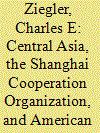

|
|
|
|
|
| Publication |
2013.
|
| Summary/Abstract |
This paper examines U.S. engagement in Central Asia over the past two decades, with specific reference to the Shanghai Cooperation Organization. While alarmist voices occasionally warn of the threat to American interests from China and Russia through the SCO, the organization's influence appears limited. Washington has engaged it only sporadically, preferring to conduct relations bilaterally with the Central Asian states.
|
|
|
|
|
|
|
|
|
|
|
|
|
|
|
|
| 2 |
ID:
082255
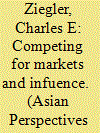

|
|
|
|
|
| Publication |
2008.
|
| Summary/Abstract |
This article discusses the asset acquisitions of Asian national oil companies (NOCs) in the energy-rich states of Russia and Central Asia, and considers the implications for economic and geopolitical stability. Asian NOC investment in these countries is analyzed in terms of state-level political and economic relations, as well as the regional and local impact of NOC activity on the host country. Asian NOCs, and the governments that support them, face few political obstacles in dealing with Eurasia's authoritarian regimes. Asian companies operate in business cultures similar to those in Eurasia, and have fewer reservations about engaging in bribery or corruption than their Western counterparts. These advantages are offset by the entrenched position of Western and Russian oil companies, and a strong commitment of the host states to political and economic independence
|
|
|
|
|
|
|
|
|
|
|
|
|
|
|
|
| 3 |
ID:
112784


|
|
|
|
|
| Publication |
2012.
|
| Summary/Abstract |
Russia's approach to sovereignty reflects a close linkage between the recentralizing project domestically, and reassertion of Russia's position as a great power on the international scene. This article assesses the relative utility of constructivist and realist approaches in Russian readings of sovereignty. A constructivist approach is found to be more useful in treating sovereignty - it directs our attention toward the problem of developing a new post-Soviet identity, the role of culture and historical interpretation in foreign policy, Russian concepts of the hostile Other and domestic ideas linked to Russian concepts of federalism - all critical factors in understanding Russian foreign policy behavior. The major ideological construct of the post-communist period - sovereign democracy - insists that both sovereignty and democracy are socially and culturally determined, and therefore clash with Western interpretations of these concepts. The emergence of a new, post-modern and Western-dominated set of global norms limiting sovereignty is closely linked to continued tensions between Russia and the West.
|
|
|
|
|
|
|
|
|
|
|
|
|
|
|
|
| 4 |
ID:
145109
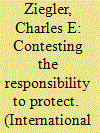

|
|
|
|
|
| Summary/Abstract |
This article explores the responsibility to protect (R2P) as a contested norm through a detailed study of the position of one major power—Russia—and brief consideration of those of the remaining BRICS. Although Russia's position on R2P has been toward the extreme end of the oppositional spectrum, Russia's concerns about the implementation of R2P are reflected in statements advanced by other BRICS members. Non-Western perspectives on the R2P are explored through the evolution of Russian foreign policy responses to R2P over three periods: from NATO's bombing of Yugoslavia to the UN Summit in 2005; from 2005 to 2011, when Moscow misapplied the R2P norm in the Russo-Georgian war; and the debates in 2011–2013 over R2P in the Libyan and Syrian cases. International pressure has been sufficiently strong to induce formal adherence to the norm of protecting vulnerable populations, though sovereignty issues and concerns about the implementation of R2P make internalization of the norm among non-Western states problematic in the near future.
|
|
|
|
|
|
|
|
|
|
|
|
|
|
|
|
| 5 |
ID:
147700
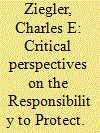

|
|
|
|
|
| Summary/Abstract |
The articles in this Special Issue derive from a conference on the Responsibility to Protect (R2P) held under the auspices of the Center for American and Global Security at Indiana University–Bloomington, 15–16 May 2015. The studies in this issue variously explore the development of the R2P in the United Nations, assess the role of the International Criminal Court in bringing perpetrators of mass atrocities to justice, introduce a territorial dimension to R2P, and elucidate the current position of non-Western emerging countries, specifically the BRICS, on R2P. The most ardent advocates of the doctrine tend to be from the major English-speaking liberal democracies, although prominent African statesmen were also instrumental in promoting the concept. The Libyan experience prompted a reassessment of R2P, magnifying suspicions that the norm may be simply a Western strategy for enhancing influence and effecting regime change. The idea of state sovereignty as responsibility domestically, and the possibility of international assistance to regimes struggling to protect vulnerable populations, has widespread support in the non-Western world. Coercive measures against predatory regimes are not rejected wholesale, but the BRICS are suspicious of Western motives in advocating forcible intervention and justifiably skeptical that such interventions will do more good than harm.
|
|
|
|
|
|
|
|
|
|
|
|
|
|
|
|
| 6 |
ID:
121851
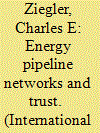

|
|
|
|
|
| Publication |
2013.
|
| Summary/Abstract |
Energy pipeline networks tie nations together in webs of interdependence that are mutually beneficial but which also make countries vulnerable. This article explores the relationship between political trust and energy pipelines connecting Russia and the European Union (EU). It seeks to explain low levels of trust in the EU-Russia energy relationship, varying levels of energy cooperation and trust within the EU toward Russia, and whether the EU-Russia energy relationship is representative of vulnerabilities shared by producers and consumers in other contexts. Rationalist approaches that focus on interests and reciprocity are incomplete and should be supplemented by a concept of trust based on normative factors. This article finds that political disputes with transit and consumer states, competing norms, and the legacy of mistrust from the Cold War (especially among certain East European countries) combined to form a uniquely toxic relationship.
|
|
|
|
|
|
|
|
|
|
|
|
|
|
|
|
| 7 |
ID:
005064
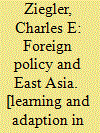

|
|
|
|
|
| Publication |
Cambridge, Cambridge University Press, 1993.
|
| Description |
xii, 197p.
|
| Standard Number |
0521425646
|
|
|
|
|
|
|
|
|
|
|
|
Copies: C:1/I:0,R:0,Q:0
Circulation
| Accession# | Call# | Current Location | Status | Policy | Location |
| 036241 | 327.4705/ZIE 036241 | Main | On Shelf | General | |
|
|
|
|
| 8 |
ID:
149739


|
|
|
|
|
| Summary/Abstract |
This article draws on the authoritarian promotion literature to assess contending pressures for democratization and authoritarianism in Central Asia. Domestic actors ultimately determine receptivity to democracy promotion, but external pressures for democratic transformation or authoritarian persistence exist in Central Asia. A brief overview of authoritarian trends in Central Asia is followed by the theoretical arguments for authoritarian persistence, with special attention to the civil society dimension in Kazakhstan, Kyrgyzstan and Tajikistan. Western programmes supporting liberal democracy and civil society have encountered resistance from authoritarian leaders in Central Asia, though the evidence for direct influence from authoritarian external actors is limited. A process of indirect authoritarian diffusion, in combination with the region’s illiberal societies and Western democracy promotion fatigue, undermines the development of civil society and makes authoritarian persistence in Central Asia likely.
|
|
|
|
|
|
|
|
|
|
|
|
|
|
|
|
| 9 |
ID:
081868
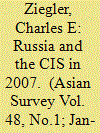

|
|
|
|
|
| Publication |
2008.
|
| Summary/Abstract |
Russia in 2007 moved further away from a constitutional order governed by the rule of law as President Vladimir Putin's second term drew to a close and the country prepared for parliamentary and presidential elections. High oil and gas prices buoyed the economy, but little progress was made in addressing Russia's serious social problems. In foreign policy, confrontation with the West was balanced by excellent relations with most of Asia
|
|
|
|
|
|
|
|
|
|
|
|
|
|
|
|
| 10 |
ID:
086688


|
|
|
|
|
| Publication |
2009.
|
| Summary/Abstract |
Russia's seamless presidential succession produced no major changes in domestic politics or foreign policy. Ties with Asia remained strong, though several key relationships-with China, Japan, and the Central Asian states-frayed under the impact of Russia's military action in Georgia. Impressive economic performance in the first half of the year boosted Russian confidence as a great power, but its vulnerability to the global financial crisis together with the heavy-handed operation in the Caucasus undermined Moscow's standing with both Asia and Europe by the end of the year.
|
|
|
|
|
|
|
|
|
|
|
|
|
|
|
|
| 11 |
ID:
135274


|
|
|
|
|
| Summary/Abstract |
With US and North Atlantic Treaty Organization (NATO) forces poised for a major drawdown from Afghanistan in 2014, and Russia determined to strengthen its influence in the “near abroad,” new uncertainties face the volatile post-Soviet Central Asian states. Changing power alignments in the region will pose new challenges for the United States, Russia, China, and the European Union. This article assesses the evolving direction of great-power interaction and influence in Central Asia, focusing on Moscow's growing assertiveness in the region. Using a neoclassical realist framework, I argue that geographic, historical, and cultural ties; a military presence; and developing economic institutions favor Russia over the short term, although China is best poised to expand regional influence over the long run. US war weariness, budget constraints, and distance suggest that—barring new major terrorist threats emanating from the region—Washington's presence and influence will gradually diminish
|
|
|
|
|
|
|
|
|
|
|
|
|
|
|
|
| 12 |
ID:
147705


|
|
|
|
|
| Summary/Abstract |
Russian leaders consider the Responsibility to Protect (R2P) a Western liberal democratic norm that erodes sovereignty and threatens Russia’s great power status. They suspect the United States and Europe use R2P as a means of effecting regime changes that support their national interests, not as a purely altruistic effort to protect vulnerable populations. Having experienced state collapse, societal fragmentation, and a weakened foreign policy over the past two decades, Russia rejects the Western universalist interpretation of R2P in favor of a civilizational perspective that privileges the Kremlin’s interpretation of when intervention is or is not legitimate. A close analysis of domestic factors in Russian politics, combined with an understanding of Moscow’s newly confident approach to geopolitics, are needed to understand Russia’s position as one of the most vocal critics of the Responsibility to Protect.
|
|
|
|
|
|
|
|
|
|
|
|
|
|
|
|
| 13 |
ID:
181613


|
|
|
|
|
| Summary/Abstract |
China and Russia consider themselves great powers, and there is agreement in both Beijing and Moscow on cooperating to limit or constrain America’s ability to dominate international relations and challenge their sovereignty.
|
|
|
|
|
|
|
|
|
|
|
|
|
|
|
|
|
|
|
|
|